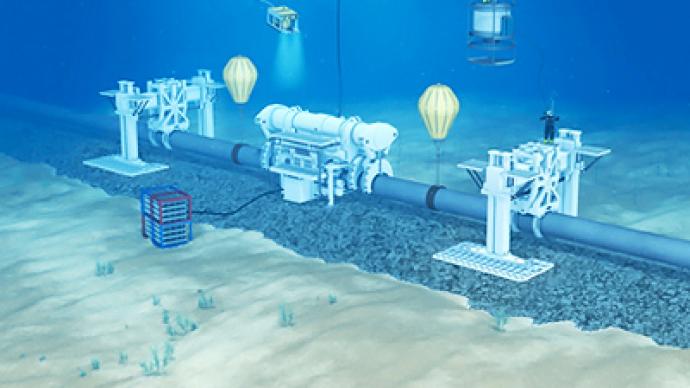Nord Stream and its implication for European gas

With Nord Stream finished laying the first line of the underwater gas pipeline across the Baltic, Business RT spoke with Standard & Poor's oil and gas equity analyst, Christine Tiscareno, to discuss the impact of the $11 billion project.
RT: What difference will Nord Stream make to the way gas is distributed in Europe?CT: Well I think the Nord Stream pipeline will add security to Germany in particular, particularly now that Libya’s gas exports to Europe have been disrupted.We find that most of Europe, the storage capacity about half full.So it will come just in time.We see predictions of European gas demand increasing by about 1.2% this year, and they may go as far as 3% at the beginning of next year.It all depends on the economic recovery, and once the economic recovery is set we will definitely need the natural gas from that pipeline.RT: A pipeline is a long-term investment, is there going to be sufficient demand in Europe going forward to justify its construction?CT: Well the demand will be there, particularly because according to the Energy Information Agency 50% increase in electricity consumption worldwide is expected over the next 15 years.Now we also have all the new gadgets, the Ipod, the Iphone, and all those toys that we have, they require more electricity.Now production of electricity can be done through wind, it can be done through coal power generating plants, or it can be done through nuclear plants.Now nuclear plants, at the moment because of the incident in Japan, have been put on hold and are being restarted.But all of the alternatives are very expensive and require government subsidies.If you compare for example, coal which is relatively cheap, versus a gas powered generating plant, a gas powered generating plant costs a third less.It does not require subsidies.It is significantly cheaper to operate, and it is much more energy efficient.Now 50% of European power plants are more than 20 years old, so they need replacement, and the estimate at the moment is that all of these plants will be replaced with natural gas powered generating plants.And that’s where it is coming from, because at the moment we have depressed natural gas prices, people think that we have more than enough gas, but you’ve got to remember that this is coming from the recession.We expect the economy to recover at some point.In fact industrial demand in Europe is beginning to recover.Now when that happens are we going to have enough gas? The current excess of LNG that we have is LNG that is two thirds contracted already, and we wont get any new LNG investments until after 2016.so for the moment if the economy recovers we will see that natural gas has a very bright outlook in Europe in particular.For Russia it is a bright outlook for supply of natural gas for Europe.European natural gas fields are declining, so out necessity for Russian natural gas imports increases as time goes by.And the main fields in Russia that will produce supply for Europe have not been constructed yet. Those are the Yamal and Shtokman fields.So this pipeline is important so that we can start supplying Europe in the meantime.RT: The EU's third energy package has been heavily criticized by some companies working in the sector. Do you think projects such as Nord Stream would get funding if the supplier of the gas, in this case Gazprom, is not allowed to own the means of distribution?CT: Well the problem is that we want to lower the price of energy consumption and energy prices in Europe – for that need to liberalize the pipelines. I don’t think that it will disrupt Gazprom supply of Europe if it contributes to the liberalization of Europe because that will increase demand.So although they might think that it hurts them it doesn’t really because if the price of gas to a certain degree become more available and cheaper for all of Europe, it is ultimately higher demand for Russia. So I don’t think it will affect them. A lot of the controversy for this pipeline was because of the fact that this company is based in Switzerland where it is not very transparent, so we think that economically it might not be profitable, and that is the reason why it’s being built privately.And secondly we have the situation in Poland.It’s going to cross the waterway close to where Poland is building its LNG plant, which means that they will not be able to accept LNG boats larger than 30 metres, and basically limit the growth of LNG into Poland.So people have said, maybe sarcastically, that Russia is trying to prevent Poland from being able to import gas from other sources, rather than just from Russia.But that is all speculation, so far we have the demand and we don’t think that having liberalized pipelines in the European Union will hurt Russian interests.On the contrary, it will make gas much more profitable, and much more in demand, and that ultimately is good news for Russia, because it increases demand.












